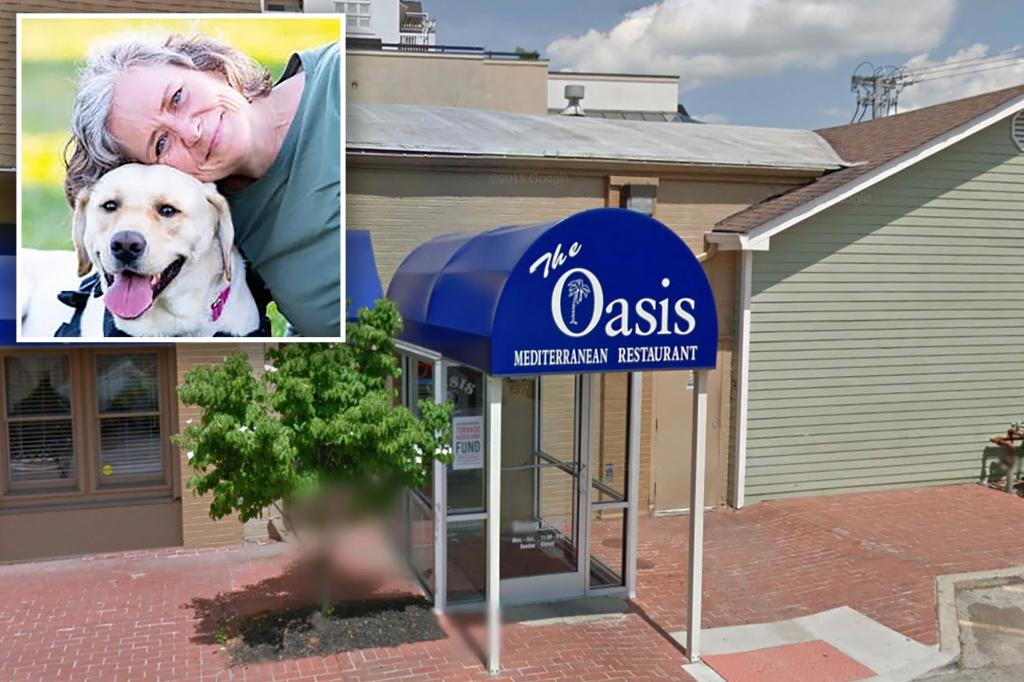A Kentucky restaurant was slapped with a $25,000 fine after refusing to serve a disabled Navy veteran because of her service dog, officials said.
The Lexington-Fayette County Human Rights Commission ruled Oasis Mediterranean Restaurant and owner Ahmad Salah violated state and city anti-discrimination laws when they ordered Sarah Van Vooren to leave the Chevy Chase eatery in March 2023.
“The offense was intentional and it was severe,” a hearing officer wrote in the ruling adopted Sept. 15 by the commission.
News of the ruling was first reported by the Lexington Herald-Leader.
Van Vooren, now a Fayette County Public Schools teacher, filed her complaint last year after Salah blocked her and her service dog, a blond Labrador named Mooney, from accessing the restroom and buffet.
The commission launched an investigation and issued a probable cause determination before the case went before the hearing officer.
The officer concluded that Salah “unlawfully discriminated” against Van Vooren by refusing to accommodate her disability.
According to the officer’s report, Salah seated Van Vooren and Mooney but blocked them when they attempted to pass the buffet to reach the restroom.
Salah then told Van Vooren she could not remain in the restaurant with Mooney.
Van Vooren took out her cell phone and recorded Salah telling her to leave, evidence the officer said supported her claims of discrimination.
“Specifically, the violation stemmed from the fact that even though Ms. Van Vooren was a disabled individual accompanied by a service animal, (Saleh and Oasis) refused to accommodate her request to use the restaurant’s restroom and presumably the use of its buffet table,” the report stated.
Salah told the commission that his actions were based on food safety concerns, citing health department regulations.
But the Lexington-Fayette County Health Department explicitly allows service animals in dining areas, including near buffets.
The officer rejected Salah’s explanation, writing that he “did not show any signs of remorse” during testimony.
“In fact, he expressed the opposite point of view, in that he didn’t think he had to be nice to someone who was making a scene in his restaurant.”
Salah attempted to argue he had denied access only to Mooney, not Van Vooren herself. The officer called that “a distinction without a difference,” ruling that excluding a service animal is equivalent to excluding the person.
Raymond Sexton, executive director of the Human Rights Commission, said the case underscored the protections afforded to disabled Kentuckians.
“This is a significant victory for the Commission and Ms. Van Vooren, whose only transgression that day was wanting to enjoy a nice lunch while accompanied by her service dog,” Sexton said in a statement.
“This case is a stark reminder that disabilities come in many forms, both seen and unseen. Our anti-discrimination laws exist to ensure that everyone (including the disability community) has equal access to employment, housing and public accommodations and our office will vigorously enforce them.”
The $25,000 fine was deemed appropriate by the hearing officer given the intentional nature of the violation.
Van Vooren did not immediately comment on the decision.
Salah also did not respond to a request for comment.
After Van Vooren filed her complaint, another customer, Danielle Burton, filed a separate complaint in June 2024. Burton, who is visually impaired and uses a seeing-eye dog named Violet, alleged that Salah also denied her access to the buffet.
That complaint remains pending.
The officer’s report emphasized that under Kentucky law and Lexington ordinances, restaurants must accommodate service animals.
Federal law under the Americans with Disabilities Act also protects access to public spaces for people with service dogs.
The commission formally adopted the officer’s ruling on Sept. 15. Salah has 30 days to appeal the decision to Fayette Circuit Court.
The commission’s order requires Oasis to pay Van Vooren $25,000 in damages. The ruling did not indicate whether further penalties could be imposed in Burton’s separate case.
The report detailed how Salah resisted compliance even during proceedings, reiterating that he believed he was justified. That defiance contributed to the size of the fine, the officer noted.
Read the full article here
